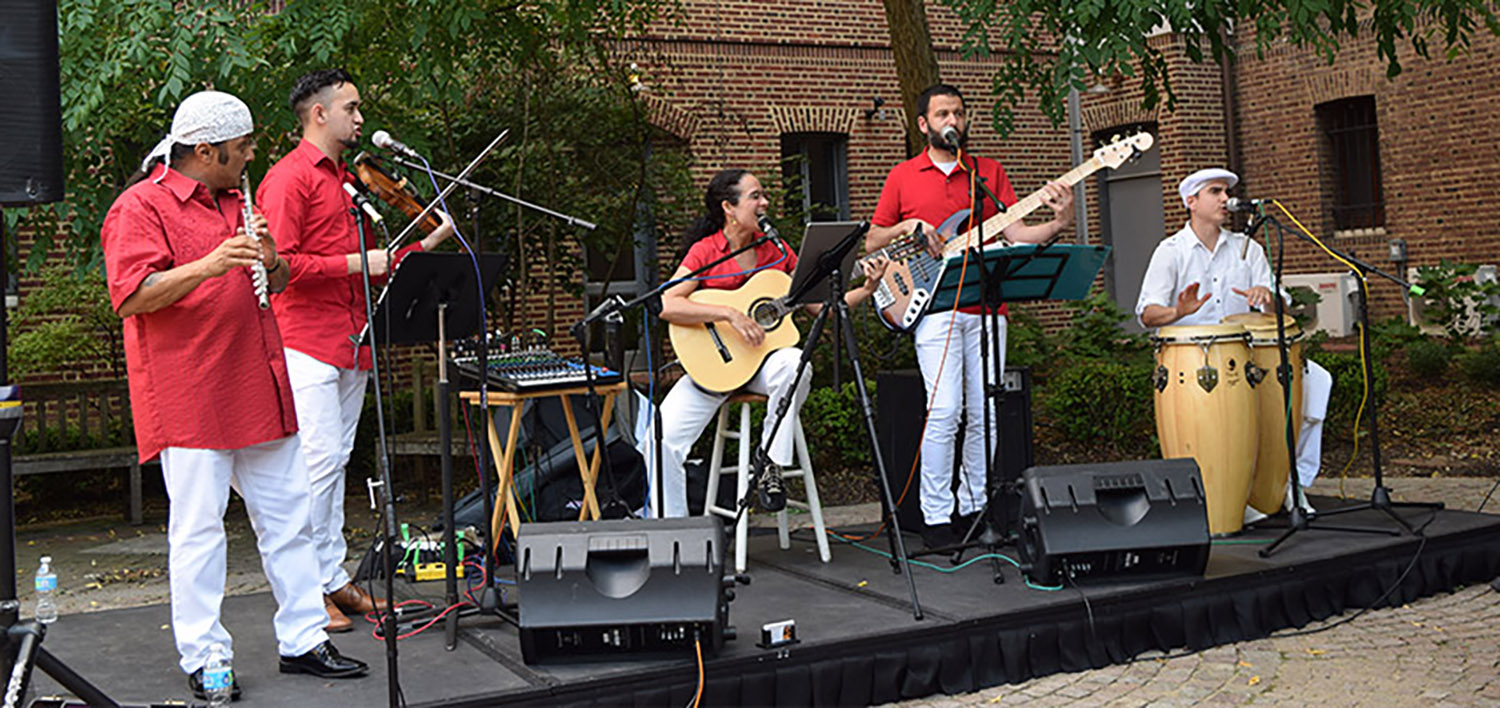Joseph S. Francisco: President’s Distinguished Professor of Earth and Environmental Science
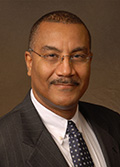 On July 1, Joseph S. Francisco joined Penn as the President’s Distinguished Professor of Earth and Environmental Science, with a secondary appointment in the department of chemistry. Having served as the Elmer H. and Ruby M. Cordes Chair in Chemistry and Dean of the College of Arts and Sciences at the University of Nebraska–Lincoln, Dr. Francisco is an internationally recognized scholar of atmospheric chemistry and chemical kinetics. His work extends across chemical, earth and environmental sciences.
On July 1, Joseph S. Francisco joined Penn as the President’s Distinguished Professor of Earth and Environmental Science, with a secondary appointment in the department of chemistry. Having served as the Elmer H. and Ruby M. Cordes Chair in Chemistry and Dean of the College of Arts and Sciences at the University of Nebraska–Lincoln, Dr. Francisco is an internationally recognized scholar of atmospheric chemistry and chemical kinetics. His work extends across chemical, earth and environmental sciences.
Dr. Francisco has served as atmospheric and ocean science editor for Pure and Applied Geophysics, and as a member of the editorial advisory boards of the Journal of the American Chemical Society, Journal of Physical Chemistry, Journal of Molecular Structure Theochem, Spectrochemica Acta Part A and Theoretical Chemistry Accounts. He is the co-author of the fundamental textbook, Chemical Kinetics and Dynamics, as well as more than 600 peer-reviewed publications in the fields of atmospheric chemistry, chemical kinetics, quantum chemistry, laser photochemistry and spectroscopy.
Dr. Francisco is a fellow of the American Chemical Society, the American Physical Society, the American Association for the Advancement of Science and the American Academy of Arts and Sciences and is a member of the National Academy of Sciences. He was elected President of the American Chemical Society for 2010. Dr. Francisco was appointed a member of the President’s Committee on the National Medal of Science by former President Barack Obama and is a former member of the Naval Research Advisory Committee for the Department of the Navy. He is a past president of the National Organization for the Professional Advancement of Black Chemists and Chemical Engineers. Among his other distinguished honors are the Alexander von Humboldt U.S. Senior Scientist Award, John Simon Guggenheim Fellowship and five honorary degrees.
The President’s Distinguished Professorship was established anonymously in 2017 to support a faculty member in the School of Arts and Sciences whose teaching and research is focused on global topics.
John Lapinski: Robert A. Fox Leadership Professor of Political Science
 Professor of political science John Lapinski was named the Robert A. Fox Leadership Professor of Political Science and the director of the Robert A. Fox Leadership Program effective July 1. A renowned expert on national elections, survey research and Congress, Dr. Lapinski is also Director of the Elections Unit at NBC News and analyzes and produces election-related stories through exit polls for NBC News, MSNBC, CNBC, Telemundo and all of NBC’s digital properties. In addition, he is the founding faculty director of Penn’s Program for Opinion Research and Election Studies (PORES), which trains undergraduates in public policy, elections research and data analytics. He also currently serves as the associate faculty director of the Fox Program and the faculty director of the Fels Executive Master of Public Administration Program.
Professor of political science John Lapinski was named the Robert A. Fox Leadership Professor of Political Science and the director of the Robert A. Fox Leadership Program effective July 1. A renowned expert on national elections, survey research and Congress, Dr. Lapinski is also Director of the Elections Unit at NBC News and analyzes and produces election-related stories through exit polls for NBC News, MSNBC, CNBC, Telemundo and all of NBC’s digital properties. In addition, he is the founding faculty director of Penn’s Program for Opinion Research and Election Studies (PORES), which trains undergraduates in public policy, elections research and data analytics. He also currently serves as the associate faculty director of the Fox Program and the faculty director of the Fels Executive Master of Public Administration Program.
John DiIulio, the Frederic Fox Leadership Professor of Politics, Religion and Civil Society and current director of the Fox Leadership Program, noted that “John Lapinski has brilliantly mentored numerous Fox-supported undergraduate fellows while helping greatly to expand fellowships from 50 in 2012 to more than 150 in each of the last two years. His exciting vision for both PORES and Fox is all about equipping and empowering students and recent alumni for 21st century leadership challenges.”
“We are delighted,” said Penn Arts and Sciences Dean Steven J. Fluharty, “to have John Lapinski take the helm of the outstanding program that Bob and Penny Fox have so generously endowed, and that his predecessor, John DiIulio, did so much to make a crowning success.” Dr. Lapinski, he added, “is a major force in national media affairs and through his expertise and dedicated service he has enriched the School and the educational experiences of our students in many ways.
Robert A. Fox Leadership Professor Dennis DeTurck, the former Dean of the College of Arts and Sciences, added that “John’s outstanding contributions to Penn include his service as chairperson of the undergraduate program in political science,” and Nora Lewis, Vice Dean of the College of Liberal and Professional Studies (LPS) commented that “Professor Lapinski has served in a leadership role on the LPS faculty oversight committee for many years, providing invaluable support to advance the LPS mission of promoting access and innovation in educational programming. We are grateful for his vision and commitment.”
Established in 1999, the Fox Program has received more than $32 million in support from Robert A. Fox, C’52, and Penny Grossman Fox, Ed’53. Past holders of the Robert A. Fox Leadership chair have included former Penn President Judith N. Rodin, who served as acting faculty director of the Fox Program in 2001, and Zellerbach Family Professor of Psychology Martin E.P. Seligman.
Gregory Pellicano: Vice President, Audit, Compliance and Privacy
 President Amy Gutmann and EVP Craig Carnaroli announced the promotion of Gregory (Greg) J. Pellicano to Vice President for Audit, Compliance and Privacy which was effective June 22 from his prior role as the Associate Vice President. Mr. Pellicano, along with his 33-member professional staff, provide assurance and advisory services and oversee the compliance and privacy programs for both the University and Penn Medicine.
President Amy Gutmann and EVP Craig Carnaroli announced the promotion of Gregory (Greg) J. Pellicano to Vice President for Audit, Compliance and Privacy which was effective June 22 from his prior role as the Associate Vice President. Mr. Pellicano, along with his 33-member professional staff, provide assurance and advisory services and oversee the compliance and privacy programs for both the University and Penn Medicine.
Since joining Penn in October 2015, Mr. Pellicano has overseen and provided strategic direction to this important function. During his tenure, he reshaped the audit work plan to focus on higher level, strategic risks. More specifically, he has worked collaboratively across the University to address risks in the areas of information security, research compliance and clinical trials management. In addition, Mr. Pellicano has called attention to the risks related to third-party outsourcing arrangements.
Mr. Pellicano has refined the risk-based internal audit planning methodology, yielding a 20% efficiency by creating enhanced capacity. In the area of privacy, he has furthered Penn’s strong reputation by enhancing both the monitoring and investigatory functions at multiple sites at the Health System. In addition, he has worked to integrate the comparable functions of Penn’s recently acquired hospitals with his Office. Finally, he restructured the institutional compliance function to enhance its effectiveness.
Prior to joining Penn, he served as Vice President and Deputy Chief Compliance Officer at Shire Pharmaceuticals. He has also held various senior level risk and assurance positions at several Fortune 500 companies during his 33-year professional career. His appointment was approved by the Trustees in June.
Mark Kocent: University Architect
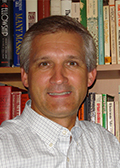 After a wide-ranging search, Mark Kocent, was appointed as the University Architect effective July 2.
After a wide-ranging search, Mark Kocent, was appointed as the University Architect effective July 2.
Mr. Kocent has served as Penn’s Principal Planner for the past 14 years, supporting the Office of the University Architect in all aspects of architect selection, design review, campus planning and community engagement. He has served on the Boards of AIA Philadelphia, the Penn Design Alumni Association, and as a member of the Steering Committee of the Schuylkill River Development Corporation. He also represents Penn in multiple local and regional planning initiatives and in speaking engagements at local and national AIA, AICP and Society for College and University Planning conferences.
Mr. Kocent managed the creation of the University’s award-winning Penn Connects campus master plan and its subsequent 2.0 and soon to be released 3.0 updates. This 30-year vision guides the development framework of the University’s 300-acre West Philadelphia campus with a focus on eastern expansion opportunities along the Schuylkill River, the evolution of the 40th Street corridor and the emerging Pennovation Works tech transfer hub. From 2006-2017 these plans have produced over 6 million square feet of new development, 2.7 million square feet of renovated space and 30 additional acres of open space, with a total of $3.8 billion of capital investment in University City.
Mr. Kocent holds an undergraduate degree in the design of the environment and a master’s in city planning and urban design from PennDesign as well as a bachelor of architecture from Drexel. His professional experience includes 20 years of architectural and planning practice in Philadelphia, including eight years with Venturi, Scott Brown and Associates. His 40-year relationship with Penn includes his design of the Class of 1982 Ivy Day stone located on Fagin Hall http://www.library.upenn.edu/exhibits/pennhistory/ivystones/ivystones.html
School of Design Teaching Awards
The G. Holmes Perkins Teaching Awards are presented annually, based on the input of students at PennDesign, to recognize distinguished teaching and innovation in the classroom, seminar or studio. These awards were named in honor of the architect and longtime faculty member who served as dean of the School 1951-1971 and were presented at the school’s awards ceremony by Frederick Steiner, dean of the School of Design and Paley Professor.
G. Holmes Perkins Distinguished Teaching Award for Standing Faculty
 Sharon Hayes, associate professor of fine arts, is this year’s recipient. She is an artist whose work engages multiple media, including video, performance and installation, in an ongoing investigation into specific intersections between history, politics and speech. Ms. Hayes has had solo exhibitions at Andrea Rosen Gallery, New York; Tanya Leighton Gallery, Berlin; Whitney Museum of American Art, New York; and Museo Nacional Centro de Arte Reina Sofía, Madrid. Her work was included in the 2013 Venice Biennale, as well as exhibitions at the Museum of Modern Art, New York; Solomon R. Guggenheim Museum, New York; and numerous museums and venues in Europe and the Americas. Ms. Hayes is a recipient of a Guggenheim Fellowship (2014), the Alpert Award in Visual Arts (2013), an Anonymous Was a Woman Award (2013), and a Louis Comfort Tiffany Foundation Fellowship (2007) among other awards. She earned master of fine arts from the University of California, Los Angeles, and a bachelor of the arts from Bowdoin College. Ms. Hayes also attended the Whitney Museum of American Art Independent Study Program. Ms. Hayes teaches both graduate and undergraduate studio courses, including video and performance, as well as interdisciplinary courses such as Across Forms: Art & Writing.
Sharon Hayes, associate professor of fine arts, is this year’s recipient. She is an artist whose work engages multiple media, including video, performance and installation, in an ongoing investigation into specific intersections between history, politics and speech. Ms. Hayes has had solo exhibitions at Andrea Rosen Gallery, New York; Tanya Leighton Gallery, Berlin; Whitney Museum of American Art, New York; and Museo Nacional Centro de Arte Reina Sofía, Madrid. Her work was included in the 2013 Venice Biennale, as well as exhibitions at the Museum of Modern Art, New York; Solomon R. Guggenheim Museum, New York; and numerous museums and venues in Europe and the Americas. Ms. Hayes is a recipient of a Guggenheim Fellowship (2014), the Alpert Award in Visual Arts (2013), an Anonymous Was a Woman Award (2013), and a Louis Comfort Tiffany Foundation Fellowship (2007) among other awards. She earned master of fine arts from the University of California, Los Angeles, and a bachelor of the arts from Bowdoin College. Ms. Hayes also attended the Whitney Museum of American Art Independent Study Program. Ms. Hayes teaches both graduate and undergraduate studio courses, including video and performance, as well as interdisciplinary courses such as Across Forms: Art & Writing.
One student said, “Sharon Hayes is a brilliant artist and a deeply committed and thoughtful teacher. Her syllabus is incredibly inclusive and opens up the field of performance and conceptual art while remaining deeply rigorous. She takes her students work very seriously and gives attention and feedback so generously. What an honor to get to study with her!” Another student said, “Sharon has continually gone above and beyond as an educator. The amount of time and work she puts into her classes, studio visits, one-on-one meetings and critiques is endlessly inspiring (not even accounting for how much labor goes into her own artistic practice). She is simultaneously thoughtful, critical, generous, supportive, kind and challenging. I’ve continually witnessed her take more and more onto her plate, without sacrificing us as students.”
G. Holmes Perkins Distinguished Undergraduate Teaching Award
 Eric Bellin, lecturer and PhD candidate in architecture, is this year’s recipient of the award for underegraduate teaching. This award rotates each year between architecture and fine arts.
Eric Bellin, lecturer and PhD candidate in architecture, is this year’s recipient of the award for underegraduate teaching. This award rotates each year between architecture and fine arts.
Eric Bellin’s research deals primarily with 19th through 20th century histories and theories of architectural detailing in France, Britain and America. Other research interests include: histories of construction, architectural technology, post-war ‘humanism’ in architecture, and design education. He earned a master of science in architectural pedagogy and a master of architecture from the University of Florida, where he also earned a bachelor of design. He teaches both graduate and undergraduate architecture courses, including a recent graduate research studio entitled Drifting Symmetries: Towards a new botanic infrastructure.
A student said, “Eric’s mentoring in the architecture studio so far has been transformative to how I approach the discipline. His emphasis on rigor and process combined with an eye for the individual style and strength of each student and their goals has been inspiring for me. I feel challenged every day in studio but deeply motivated to work my hardest for every meeting —each crit with him feels like an opportunity for real personal growth. I can’t overstate my satisfaction with how he pushes us to get the most out of our studios.” Another student said, “Eric has consistently pushed me to create the best work. He was always available outside of class time and by email. He even went so far as to send me resources and inspiration on his own time and volition.”
G. Holmes Perkins Distinguished Teaching Award, Non-Standing Faculty
 Ben Krone, a lecturer in architecture, is this year’s recipient. He is the founder of Gradient, a design studio whose work focuses on procedural approaches to manipulating surface systems and bridging the gap between architecture, product design and graphic art. His past achievements include an installation for the Cooper Hewitt Design Museum, collaborations with several acclaimed artists and multiple award-winning residential and commercial projects. Currently Gradient is working on a number of larger projects including boutique hotel in Brooklyn and a large residential tower in Jersey City. Mr. Krone earned his bachelor of architecture from the University of Florida. He received his master’s degree from Columbia University Graduate School of Architecture, where he was the recipient of the McKim Prize for Excellence in design and the Sol Kaplan Traveling Fellowship. He teaches graduate studio courses, including recent design studios entitled Co/Habitation and Perpetual Motion. He also teaches in the Integrated Product Design program at Penn.
Ben Krone, a lecturer in architecture, is this year’s recipient. He is the founder of Gradient, a design studio whose work focuses on procedural approaches to manipulating surface systems and bridging the gap between architecture, product design and graphic art. His past achievements include an installation for the Cooper Hewitt Design Museum, collaborations with several acclaimed artists and multiple award-winning residential and commercial projects. Currently Gradient is working on a number of larger projects including boutique hotel in Brooklyn and a large residential tower in Jersey City. Mr. Krone earned his bachelor of architecture from the University of Florida. He received his master’s degree from Columbia University Graduate School of Architecture, where he was the recipient of the McKim Prize for Excellence in design and the Sol Kaplan Traveling Fellowship. He teaches graduate studio courses, including recent design studios entitled Co/Habitation and Perpetual Motion. He also teaches in the Integrated Product Design program at Penn.
A student said, “Ben was invested in each individual project and encouraged and pushed each student to go above and beyond in each project. Through him, we learned the strength of a potent design concept and how this gets translated into a building’s form and use. This skill and the methodology of Ben’s approach is something that will be remembered and carried throughout my design career.” Another student said, “Excellent architecture professor, probably one of the best professors I’ve ever had. Very encouraging, insightful and involved in making sure each student succeeds.”
From the President: Statement on Penn's Connections to Slavery
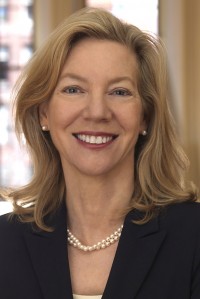 Important research undertaken by undergraduate students in the Penn Slavery Project independent study supervised by Penn Professor Kathleen M. Brown, the David Boies Professor of History in the School of Arts and Sciences, has given us a clearer understanding of the depth and breadth of Penn’s connections to slavery. This was a profoundly painful and odious part of our nation’s history. No segment of American society or institution founded during the 18th century, including the University of Pennsylvania, escaped its scourge. Far from it.
Important research undertaken by undergraduate students in the Penn Slavery Project independent study supervised by Penn Professor Kathleen M. Brown, the David Boies Professor of History in the School of Arts and Sciences, has given us a clearer understanding of the depth and breadth of Penn’s connections to slavery. This was a profoundly painful and odious part of our nation’s history. No segment of American society or institution founded during the 18th century, including the University of Pennsylvania, escaped its scourge. Far from it.
Members of the Penn Slavery Project reported their findings at the end of the fall 2017 semester. As a result of their work and additional research undertaken by the University, I charged Provost Wendell Pritchett, who holds a PhD in history from Penn, with leading a Working Group to help outline the contours of additional research that should be pursued and to recommend next steps. The Working Group included Senior Vice President and Chief Diversity Officer Joann Mitchell; Kathleen Brown, the Boies Professor and director of gender, sexuality and women’s studies; Heather A. Williams, Presidential Professor and professor of Africana studies; and Dorothy Roberts, Penn Integrates Knowledge Professor and the George A. Weiss University Professor of Law and Sociology, the Raymond Pace and Sadie Tanner Mossell Alexander Professor of Civil Rights, and professor of Africana studies. This exemplary team received research support from Arielle Brown, a program manager in Penn’s Museum of Archeology and Anthropology, and Alexis Neumann, a doctoral candidate in the department of history. The Working Group has now provided me with its report.
We now know that no fewer than 75 of the University’s early trustees owned at least one enslaved person, including Penn’s first Provost, William Smith. For 13 years, from 1757 to 1770, the University’s trustees reimbursed Ebenezer Kinnersley, Penn’s first professor of English and Oratory who also was a dormitory steward, for the work of an enslaved man that he owned. In this and other ways, the labor of enslaved people was used to support and care for Penn faculty and students. We know that the medical school’s first faculty member, Dr. John Morgan, owned at least one slave, and that he traveled to Jamaica for fundraising from prominent slaveholding families. We also learned that the medical school’s faculty, under the leadership of Dean William Horner, played pivotal roles in the development of racial pseudoscience based on the research of faculty members such as Professor Samuel Morton and Professor Charles Caldwell as well as medical school alumnus Dr. Samuel Cartwright.
Penn faculty and alumni were actively involved in framing the Constitution to support slavery and in administering state slavery laws. Alumnus and professor of mathematics Hugh Williamson was instrumental in arguing for the insertion of the three-fifths clause into the U.S. Constitution, which counted enslaved persons as three-fifths of a person for the purposes of Congressional representation. Penn alumnus and Trustee, Judge William Tilghman, was a conservative interpreter of Pennsylvania’s gradual manumission laws. Several alumni who owned enslaved people were prominent leaders or supporters of the Confederacy.
As an academic institution dedicated to uncovering and conveying the truth, the University is committed to advancing research that will enable us to more fully understand Penn’s linkages to slavery. On behalf of the University, I thank the Working Group, accept its recommendations, and charge Provost Wendell Pritchett and Senior Vice President Joann Mitchell to partner with the Deans of the appropriate Schools to continue to illuminate the University’s connections to slavery and its implications for the present and future. Specifically, for the near term, working collaboratively with our relevant Schools, Penn will:
• Support the ongoing research of the Penn Slavery Project under the leadership of Professor Kathleen Brown;
• Support research—under the leadership of Professor Dorothy Roberts and the Penn Program on Race, Science and Society—on the impact of the medical school’s pedagogy, research and medical practices on alumni and its lingering effects on medicine;
• Develop a University website to serve as a portal for and repository of research findings and other information;
• Join the Universities Studying Slavery consortium to collaborate with and learn from peer institutions; and
• Encourage Penn Schools and departments to offer educational and cultural programming that will inform our community about our past and foster opportunities for learning on campus and beyond.
We are grateful to Professor Brown and deeply proud of the work of the students in the Penn Slavery Project for their outstanding scholarship. Their work has advanced our understanding of the ways that Penn’s early trustees, faculty, administrators, alumni and students participated in and benefitted from the exploitation of enslaved people. Penn will continue this effort to learn still more about its past, disseminate our findings, grapple with the implications for our present and work to secure an ever more inclusive future. The power of knowledge advances our common good; it enables us to be stronger and wiser; and it is essential to our moving forward together.
—Amy Gutmann, President
Andrew W. Mellon Postdoctoral Fellowship in the Humanities: October 15
The Wolf Humanities Center (formerly Penn Humanities Forum) awards five one-year Andrew W. Mellon Postdoctoral Fellowships each academic year to junior scholars in the humanities who are no more than eight years out of their doctorate and who are not yet tenured (may not be tenured during the fellowship year). Scholars are required to spend the year (late August–May) in residence at Penn.
For the 2019-2020 academic year, our topic will be Kinship The Fellowship carries a stipend of $56,225 plus single-coverage health insurance (fellows are responsible for coverage for any dependents) and a $3,000 research fund. Fellows teach one undergraduate course in either the fall or the spring semester in addition to conducting their research.
The PhD is the only eligible terminal degree, and applicants must be humanists or those in such allied fields as anthropology or history of science. Ineligible categories include an MFA or any other doctorate such as EdD, social scientists, scholars in educational curriculum building and performing artists (note: scholars of performance are eligible).
The fellowship is open to all scholars, national and international, who meet application terms.
Visa eligibility: International scholars outside of North America are appointed under a J-1 visa (Research Scholar status). Scholars seeking to hold an H-1B visa during the fellowship year at Penn are ineligible (no exceptions can be made). The Wolf Humanities Center reserves the right to cancel awards if the recipient is unable to meet this condition. Applicants should consult the international programs office at their current university to confirm eligibility before applying for this fellowship.
2019-2020 Call for Applications
Application Deadline: October 15, 2018
NOTE: Applications must be submitted online through the Center’s secure webform only. Postal and email submissions will not be accepted. Decisions will be announced in late December 2018, when applicants will be notified by email.
The programs of the Center are conceived through yearly topics that invite broad interdisciplinary collaboration. For the 2019–2020 academic year, we have set Kinship as the topic.
Scholars who received or will receive their PhD between December 2010 and December 2018 are eligible to apply. You must have your degree in hand or have passed your defense no later than December 2018 to be eligible. Your application will not be considered unless this condition is met (i.e., you are ineligible to apply if you will defend or otherwise submit your dissertation anytime in 2019).
During their year in residence, fellows pursue their proposed research, are required to teach one undergraduate seminar during the year and must also participate in the Center’s weekly Mellon Research Seminar (Tuesdays, noon–1:50 p.m.), presenting their research at one of those seminars.
In selecting fellows, the Wolf Humanities Center aims for a balanced mix of recent PhDs and more seasoned tenure-track faculty who do not yet have tenure. Preference will be given to candidates whose proposals are interdisciplinary, who have not previously enjoyed use of the resources of the University of Pennsylvania and who would particularly benefit from and contribute to Penn’s intellectual life.
Grant Awards for Projects: Making a Difference in Diverse Communities
Penn Arts and Sciences has announced the 2018 funded projects for the “Making a Difference in Diverse Communities” initiative, which encourages faculty to explore innovative ways of applying their expertise. Through a combination of coursework, research and service, the projects address issues of diversity and inequality at the local, national and international level.
The researchers belong to fields as wide-ranging as public health and policy, community education, environmental studies, and film and media studies. The projects cover the entire spectrum of humanities, social science and natural science and include collaborators from other Penn schools.
In announcing the grant awards, Steven J. Fluharty, dean of Penn Arts and Sciences, said that these projects “combine the type of innovation and excellence that forms the intellectual core of Penn Arts and Sciences.” He added that he was “especially inspired by how the projects involve students in research and outreach efforts. The combination of students and faculty, working together in the classroom and in communities, can have powerful results.”
The grant recipients are:
Penn-in-Havana: Visual Culture and Public Art in Cuba: This project, led by Gwendolyn DuBois Shaw, associate professor and undergraduate chair in the history of art department, introduced Penn students to the vibrant NGO community arts scene of contemporary Cuba through support of and participation in the activities of the Cayo Hueso art collective in Havana. On the trip, Dr. Shaw was assisted by the U.S. representative for the Callejón de Hamel collective and professor of Latin American studies at Norfolk State University Geoffroy de Laforcade, who provided background lectures and on-location guidance. Students also worked directly with artist Salvador González Escalona, who first began to alter the urban landscape in Central Havana through public art, performance and cultural exchange opportunities in the 1980s. Co-faculty project director includes William Schmenner, lecturer in cinema studies.
Increasing Turnout in Off-Cycle Elections in the City of Philadelphia: This project, helmed by Daniel J. Hopkins, associate professor of political science, looks to increase voter turnout in non-presidential elections in Philadelphia. The team will generate and test novel direct-mail communications designed to heighten voter turnout in off-cycle elections by making social norms related to voting more salient. In doing so, the project will draw upon and contribute to a growing research literature on voter mobilization. The project also seeks to bolster the study of official, government-sponsored efforts to increase voter turnout, as well as close well-known gaps in political participation along racial, economic and income lines.
Philosophy for the Young: This project, led by Karen Detlefsen, professor of philosophy and education, will build on existing partnerships with Philadelphia Futures, Benjamin B. Comegys School and Penn Alexander School, and will cultivate new partnerships with schools across Philadelphia to bring philosophy to students in kindergarten through 12th grade. This initiative will take two forms: classes and clubs where philosophy is taught as a self-standing subject, as well as the integration of philosophy into existing curricula and lessons as teachers see fit. The project will include Penn undergraduates from ABCS courses, as well Penn graduate students who are already teaching philosophy to middle and high school students. Co-faculty project directors include Eli Lesser, executive director of educational innovation in the School of Social Policy and Practice, and Janine Remillard, associate professor in the teaching, learning and leadership division in the Graduate School of Education. The project is in collaboration with the Netter Center for Community Partnerships.
LAVA: Laboratorio para apreciar la vida y el ambiente (continuation of “Community Ecology in the Galapagos Archipelago”): This effort, helmed by Michael Weisberg, professor and chair of philosophy, will build upon previous project, “Community-Based Ecology in the Galapagos Archipelago,” by growing community science initiatives, such as the flagship observational study of sea lions, to include additional high school students and put more emphasis on helping them to understand the data they are collecting. In addition, the project will pilot a second community science initiative with local women, which will involve teaching them to monitor the marine reserve. The team will also move to the production phase on their Galapaguefio documentary projects. Co-faculty project directors include Susan Lindee, Janice and Julian Bers Professor of the History and Sociology of Science; Erol Akçay, assistant professor of biology; Tim Linksvayer, associate professor of biology; Deena Skolnick Weisberg, a senior fellow in the psychology department; Howard Neukrug, professor of practice; and Karen M’Closkey, associate professor of landscape architecture in the School of Design.
Using Virtual Reality and Digital Video to Document the Post-Hurricane Maria Recovery Efforts in Puerto Rico: This project, led by Peter Decherney, professor of English and cinema studies, will visit Puerto Rico nine months after hurricane Maria hit in order to re-create the experience of individuals who have worked in different circumstances to rebuild their environments and lives after the hurricane. The team will use virtual reality and video to capture these narratives. This will continue work Dr. Decherney and his students completed in Kenya, where they used similar techniques to document the refugee experience. Dr. Decherney hopes the project will also communicate the situation on the ground and the need for increased aid to policymakers, non-governmental organization leaders, and anyone who can’t travel to the island.
The “Making a Difference in Diverse Communities” initiative is a key component of the School’s commitment to advance research and teaching around issues of diversity, inequality and human well-being.
Grant Awards for Projects: Dean's Global Inquiries Fund
The Dean’s Global Inquiries Fund, an initiative that encourages the collective investigation of global topics across the liberal arts, recently awarded its second round of grants.
Dean Steven J. Fluharty established the fund to advance the School’s commitment to driving global change, a key priority in the Power of Penn Arts and Sciences fundraising campaign.
Dean Fluharty says that the funded projects “typify the global reach of our faculty. These awardees demonstrate how Penn Arts and Sciences faculty are moving their fields forward by creating avenues for international collaboration and knowledge-sharing.”
The following projects were selected to receive up to $50,000 to support a variety of activities including research, conferences, workshops, film screenings and course development. These projects are inherently collaborative, forward-thinking and interdisciplinary and use the tools of the social and natural sciences and humanities.
Trauma and the Arts, South Africa in Dialogue with Philadelphia: Led by Carol Muller, professor of music, this project brings together faculty and leaders in Philadelphia community organizations and schools as well as South African educators and artists. The goal is to create a culture of trauma-informed learning and instruction using drawing, dancing, singing, acting and storytelling as a vehicle for the emotional and psychological effects of trauma. In addition to building an online resource for knowledge-sharing, the project will include a three-day conference for all stakeholders. Involved Penn faculty include Herman Beavers, professor of English and Africana studies, and James Pawelski, professor of practice and director of education in the Positive Psychology Center.
Shared Practices, Common Legacies: Ottoman Science from a Global Perspective: This project, led by Harun Küçük, assistant professor of history and sociology of science, will organize an international workshop focused on Ottoman scientific texts. The workshop will initiate an international collaborative project to translate sourcebooks of Ottoman scientific texts from a variety of languages, religious backgrounds, and geographical areas. This endeavor addresses the lack of Ottoman sources currently in translation and applies global history, a progressive methodology that sees beyond current national or linguistic barriers. Oscar Aguirre-Mandujano, an incoming assistant professor of Ottoman history, will join the project.
Undergraduate Seminar on Comparative Ancient Epics: Peter Struck, professor and chair of Classical studies, will develop an undergraduate seminar in collaboration with Yale-NUS, based in Singapore, on five ancient texts: Gilgamesh, Iliad, Odyssey, Ramayana, and Aeneid. Dr. Struck and Mira Seo, associate professor of humanities, Yale-NUS, will teach the course on their respective campuses in spring 2019. As part of the course, Yale-NUS students will visit Philadelphia and Penn students will go to the University of Pennsylvania Museum of Archaeology and Anthropology and travel to Singapore for classes and visits to the Asian Civilizations Museum in Singapore.
Urban Sea: Living in Anthropogenic Waters: Nikhil Anand, assistant professor of anthropology, will lead 14 months of field research in Mumbai, focusing on the daily practices of fishers and dockworkers, the research practices of coastal scientists at sea, and ideological and material work of urban engineers building along the coast. By examining the life of coastal megacities from their waters, Urban Sea will examine how these spaces are inhabited in a time of extreme ecological flux. Bethany Wiggin, associate professor of Germanic languages and literatures and founding director of Penn Program in Environmental Humanities, and Anuradha Mathur, professor of landscape architecture at PennDesign, will be part of this project.
Religion and the Global Future: This project is led by Steven Weitzman, Abraham M. Ellis Professor of Hebrew and Semitic Languages and Literature and Ella Darivoff, director of the Katz Center of Advanced Judaic Studies. It is an effort to create a new kind of learning experience for students interested in the role that religion plays in international conflict, global environmental concerns and human rights issues. Dr. Weitzman will develop an undergraduate course and symposium that will include global speakers from the fields of religious studies, international relations, and public policy. Ultimately, this project will lay the groundwork to create a network of scholars who study the public policy impacts of religious studies.
Active Coating Technologies (ACT) to Mitigate the Global Water Crisis: Zahra Fakhraai, associate professor of chemistry, will lead this effort to form an international faculty working group to develop coatings that can redirect, harvest, and purify water in environments that lack access to safe water. In addition to building collaborative relationships with researchers from around the world, this project will support summer internships, located in Korea, for chemistry and engineering graduate students interested in developing reliable materials for water management. Involved Penn faculty include Daeyeon Lee, professor of chemical and biomolecular engineering, and Russell J. Composto, professor of materials science and engineering, bioengineering, and chemical and biomolecular engineering.
$2 Million Grant to Train Next Generation of Penn Medicine Physicians in Occupational and Environmental Medicine Residency Program
 The Health Resources and Service Administration (HRSA) of the U.S. Department of Health and Human Services has awarded a $2 million grant over the next five years to the Occupational and Environmental Medicine (OEM) Residency Program in the department of emergency medicine at Penn’s Perelman School of Medicine. This grant will help train the next generation of OEM physicians.
The Health Resources and Service Administration (HRSA) of the U.S. Department of Health and Human Services has awarded a $2 million grant over the next five years to the Occupational and Environmental Medicine (OEM) Residency Program in the department of emergency medicine at Penn’s Perelman School of Medicine. This grant will help train the next generation of OEM physicians.
“The Occupational and Environmental Medicine Residency program at Penn helps address a national need: the shortage of residency trained Occupational and Environmental Medicine physicians in the United States,” said Judith McKenzie, professor of emergency medicine and OEM Residency Program Director and Division Chief. “This funding will provide critical support in helping us to continue to train OEM physicians, with specific aims to further diversify the workforce and help alleviate the national shortage.”
OEM physicians are devoted to the conservation and restoration of the health of the workforce and promotion of worker health, productivity and well-being. They diagnose, treat and prevent occupational and environmental injury and disease, are experts in prevention, exposure assessment, work fitness and disability evaluations, and hazard recognition, evaluation and control. OEM specialists are also versed in toxicology and disaster preparedness and emergency management. These physicians work in various settings such as corporations, government and academia.
Since the program’s inception in 1997, Penn has graduated 125 OEM residents. Dr. McKenzie and her team plan to train 30 more residents over the next five years.
Sharon Smith: Associate Vice Provost for University Life
 Sharon Smith, Executive Director of Student Intervention Services, has been named Associate Vice Provost for University Life. Since June 19, she has been a member of VPUL’s Central Resource Management Team (CRMT) reporting directly to Vice Provost Valarie Swain-Cade McCoullum.
Sharon Smith, Executive Director of Student Intervention Services, has been named Associate Vice Provost for University Life. Since June 19, she has been a member of VPUL’s Central Resource Management Team (CRMT) reporting directly to Vice Provost Valarie Swain-Cade McCoullum.
“Sharon works tirelessly across campus on behalf of undergraduate, graduate and professional students facing complex personal, academic, familial and health challenges,” Dr. McCoullum said. “I am so pleased to recognize the depth and breadth of her commitment with this expanded leadership position.”
“I am honored to take on these new responsibilities,” Ms. Smith added. “Crisis intervention is true collaboration, and I am privileged to work with so many caring and compassionate people in VPUL and across campus.”
Ms. Smith has worked at Penn since 1987 serving in leadership positions in PENNCAP, New Student Orientation and Open Expression. She helped create the mission and framework of Student Intervention Services (SIS) and in 2002 she became SIS’ founding director. SIS leads the University’s response to emergencies and critical incidents involving students.
SIS works closely with the Offices of Counseling and Psychology Services (CAPS), Student Health Service, the Chaplain’s Office, Special Services in the Division of Public Safety, and 12 schools on short-term and long-term case management of critical situations. In this role, Ms. Smith has consulted with senior administrators, Deans, faculty, staff, alumni, families and community members in a shared mission to serve students in crisis.
The Student Intervention Services team has grown in recent years in response to the complexity of individual emergencies and institutional responses. Ms. Smith will continue to oversee her three-person team of an Associate Director, Case Manager and Outreach Coordinator.
Barbara Hewitt: Executive Director of Career Services
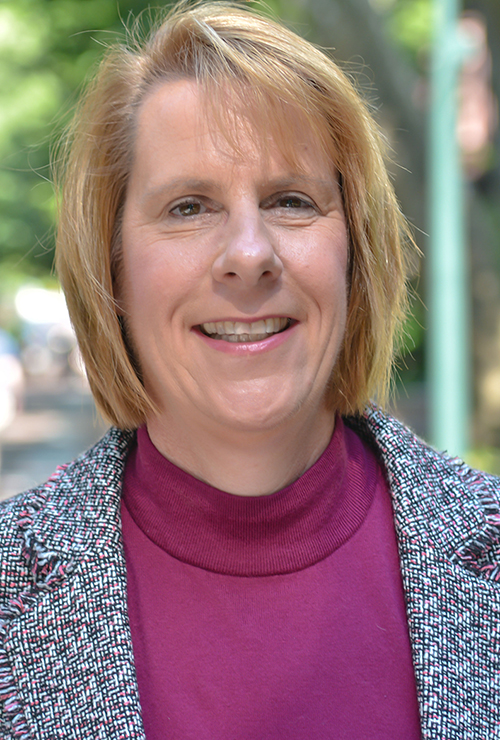 Barbara Hewitt has been named Executive Director of Career Services. Dr. Hewitt, currently Senior Associate Director, will assume her new position in August after the retirement of longtime Career Services Director Patricia Rose.
Barbara Hewitt has been named Executive Director of Career Services. Dr. Hewitt, currently Senior Associate Director, will assume her new position in August after the retirement of longtime Career Services Director Patricia Rose.
“Barb demonstrated clearly that she has the experience and vision to lead Career Services through this important transition,” said Vice Provost for University Life Valarie Swain-Cade McCoullum. “Her extensive relationships with employers and the campus community make her a valuable asset for Penn.”
“I’m incredibly excited to continue to work with Penn students, alumni, staff and faculty in my new role,” Dr. Hewitt added. “I look forward to further building upon the already strong services provided by the office in the future.”
Dr. Hewitt has worked for Career Services since 1998, being promoted from a Career Counselor in the College of Arts and Sciences to Senior Associate Director overseeing placements for Wharton undergraduates. She oversaw a campus recruiting program with 400 employers and 13,000 interviews a year, and helped implement innovative technology to aid and streamline students’ job searches.
Prior to Penn, Dr. Hewitt worked in career centers at Dickinson College, the College of Wooster and Shippensburg University.
Dr. Hewitt earned her Doctor of Education in Higher Education Administration from Penn, writing her dissertation on the Effects of Academic Achievement, Extracurricular Involvement, and Work Experience on Entry-Level Employment of College Graduates. She holds a Master of Science in counseling from Shippensburg and a bachelor’s in psychology and Spanish from Dickinson.
Jazmyn S. Pulley: Director of the Office of Fraternity and Sorority Life
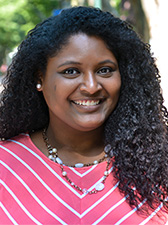 Jazmyn S. Pulley was named Director of the Office of Fraternity and Sorority Life at Penn effective July 9. A longtime member of Zeta Phi Beta Sorority Inc. and the former associate director of fraternity and sorority life at Columbia University, Ms. Pulley has national leadership experience in the Association of Fraternity/Sorority Advisors.
Jazmyn S. Pulley was named Director of the Office of Fraternity and Sorority Life at Penn effective July 9. A longtime member of Zeta Phi Beta Sorority Inc. and the former associate director of fraternity and sorority life at Columbia University, Ms. Pulley has national leadership experience in the Association of Fraternity/Sorority Advisors.
“Jazmyn comes to us as a colleague passionate about the nurturing of community in university sororities and fraternities” said Dr. Valarie Swain-Cade McCoullum, Vice Provost for University Life. “She is looking forward to working with our vibrant Penn Greek student and alumni community members to ever further promote access, inclusion and service. We are delighted to welcome her to Penn and to VPUL!”
“I am very excited to be joining the Fraternity and Sorority Life staff at the University of Pennsylvania,” Ms. Pulley added. “I have worked many years to be able to do this work and I am elated to have the opportunity to work with Penn staff, faculty, alumni and most importantly, students to make the institution and surrounding community a better place.”
Penn’s fraternity and sorority system is comprised of 49 recognized chapters with 2,900 members and 32 chapter houses—including 24 owned and operated by the University in conjunction with Campus Apartments. The Greek system includes three governing councils: Intercultural Greek Council (seven male and seven female chapters, average of 13 members/chapter); Interfraternity Council (25 male chapters, two co-ed chapters, average of 51 members/chapter), and the Panhellenic Council (eight female chapters, average of 175 members/chapter).
At Columbia, Ms. Pulley oversaw advising, recruitment, and programming for 1,800 students in 28 chapters. She led a staff restructuring, oversaw a strategic planning process and guided a review of Greek policies. Ms. Pulley previously served as assistant director of fraternity and sorority life at Pennsylvania State University and assistant director for student activities at East Stroudsburg University. She began her career working in Greek Life at Lehigh University and Temple University.
Ms. Pulley frequently presents at regional and national Greek life events on risk management, hazing and sexual assault prevention. She received both a master of arts in counseling in higher education and bachelor’s in political science and sociology from the University of Delaware.
Penn’s Strategic Collaboration with Ripple: Accelerating Innovation in Blockchain and Cryptocurrency
The Wharton School and the School of Engineering and Applied Science at the University of Pennsylvania announced the launch of The Ripple Project at Penn. This joint-school effort is supported by the blockchain-based global payments leader Ripple under its recently announced University Blockchain Research Initiative. The goal of this strategic collaboration is to support academic research, technical development and innovation in blockchain, cryptocurrency and distributed ledger technology.
Ripple’s financial donation to the University will support cross-disciplinary faculty research, financial aid for graduate students and a broad range of educational programs. The Ripple Project will enable faculty research at both Wharton and Penn Engineering to unlock the full potential of blockchain to inform the creation of truly valuable solutions in the marketplace.
As the field emerging around blockchain has grown, so has the demand for professionals with an understanding of the technology and its applications. The Ripple Fellowship will support select MBA-MS candidates each year in a newly established Wharton-Engineering dual-degree program, prioritizing students working on blockchain or cryptocurrency.
“Here at Penn, there is tremendous excitement and initiative around blockchain among faculty and students,” said Vijay Kumar, the Nemirovsky Family Dean of the School of Engineering and Applied Science. “By collaborating with Ripple, we will answer crucial questions about blockchain’s capabilities, applications and security, and we will develop a deeper understanding of the many emerging protocols built over blockchain. This level of knowledge is key to the technology’s future success.”
“Blockchain represents the fusion of technology and finance spanning schools and disciplines well beyond Wharton,” said Geoffrey Garrett, Dean of the Wharton School. “The Ripple Project will transform the way our students and faculty look at blockchain and its potential to change the world. We are thrilled to welcome Ripple’s collaboration as we prepare future leaders who will shape the future of how this dynamic technology is developed to transform fields as diverse as finance, logistics and healthcare.”
To harness the initiative of students, the insights of new research and the power of the Penn network in this field, the Ripple Project will also provide learning opportunities both inside and outside of the classroom. Ripple will support student-organized events, such as the Penn Blockchain Conference, which brings together the Penn and Philadelphia blockchain communities; the development of new curricular offerings that bridge business and technology; and events, workshops and lectures that promote engagement between industry, students and faculty.
“Blockchain is a major point of intersection between business and engineering. We plan to research a broad range of topics in in this field, ranging from privacy to smart contract design to regulatory questions to creating trust in decentralized environments,” said Kevin Werbach, associate professor of legal studies and business ethics at the Wharton School.
Penn is among the 17 initial leading global universities engaging with Ripple through its University Blockchain Research Initiative, which was launched to prepare the next generation of leaders in fintech. Each university determines its own research topics and areas of focus. In addition to financial resources, Ripple has also committed to collaborating with university partners by providing strategic guidance and technical resources to the University as needed. Demand for learning, research and project-based experience is at an all-time high among University faculty and students, and the partnership between Ripple, the Wharton School and Penn Engineering makes major strides in fulfilling that demand.
“Academia has traditionally been a critical driver of technical innovation. The University Blockchain Research Initiative is an acknowledgment of the vital importance of the unique role universities will play in advancing our understanding and application of cryptography and blockchain technology. It also speaks to the reality that university graduates will fuel a continually evolving and maturing financial marketplace and workforce,” said Eric van Miltenburg, SVP of Global Operations at Ripple. “Much of the enthusiasm and activity to date around blockchain is disconnected from real use cases that result in clear benefits to businesses or civil society. While Ripple won’t dictate research parameters, we are excited to play a role in helping to support faculty and student-led projects that explore increasingly useful applications of blockchain and cryptocurrencies.”
Ripple and Penn are hopeful that the partnership will engage students and faculty from a wide range of academic fields and backgrounds to produce interesting research and technical developments that will add value to the global blockchain ecosystem.
Ripple provides one frictionless experience to send money globally using the power of blockchain. By joining Ripple’s growing, global network, financial institutions can process their customers’ payments anywhere in the world instantly, reliably and cost-effectively. Banks and payment providers can use the digital asset XRP to further reduce their costs and access new markets. With offices in San Francisco, New York, London, Luxembourg, Mumbai, Singapore and Sydney, Ripple has more than 100 customers around the world.
Johnson & Johnson Gift: Undergraduate Financial Aid and Nursing/Wharton Impact Scholars Loan Program
 The University of Pennsylvania is pleased to announce a gift of $1 million from Johnson & Johnson to the School of Nursing and the Wharton School. This investment launches the Nursing/Wharton Impact Scholars Loan Program, a program that will increase the number of health care leaders with expertise in both business and clinical care by offering financial aid and providing underserved communities with greater access to health professionals.
The University of Pennsylvania is pleased to announce a gift of $1 million from Johnson & Johnson to the School of Nursing and the Wharton School. This investment launches the Nursing/Wharton Impact Scholars Loan Program, a program that will increase the number of health care leaders with expertise in both business and clinical care by offering financial aid and providing underserved communities with greater access to health professionals.
The Nursing/Wharton Impact Scholars Loan Program will provide forgivable loans to students pursuing the rigorous five-year dual degree through the Nursing and Health Care Management (NHCM) program, which awards undergraduate degrees from Penn Nursing and the Wharton School. NHCM students complete a demanding schedule of clinical placements and academic classes, which prepares them to become transformative practitioners and leaders. Limited financial aid beyond the standard fourth year of study can prevent completion of the program.
As part of its ongoing commitment to advancing health and wellbeing, Johnson & Johnson saw an opportunity to devote resources to these future leaders and impact the future of health care. The Impact Scholars Loan, for fifth-year students, is forgivable in exchange for graduates working with underserved communities or populations for a one- to two-year period. Twenty-five NHCM students will receive this initial distribution of financial aid over the next seven years.
“Healthcare is personal—it impacts all of us. And we believe we have a responsibility to advocate for this dynamic profession. We need more people with a passion to serve others, a spirit of ingenuity and a relentless drive for innovation. They’re out there, and this scholarship will help Penn find them and continue to nurture and support them,” said Alex Gorsky, WG ’96, Chairman and CEO, Johnson & Johnson. “Our students are tomorrow’s leaders. And by investing in them, we will continue to improve human health.”
There are currently about 3,960 federally-designated Health Professional Shortage Areas across the U.S. with approximately 46 million residents. Medically underserved communities and populations, both adults and children, typically suffer higher health disparities than those with access to health professionals.
Antonia M. Villarruel, the Margaret Bond Simon Dean of Nursing said, “Johnson & Johnson has been a critical supporter of Penn Nursing and the nursing profession for many years, and their latest investment demonstrates how strategically they think about their role in improving health care. These students are future leaders who will advance science and deliver solutions, shape policy and practice and engage communities to promote health, particularly in medically underserved communities.”
“We are so pleased that Johnson & Johnson has provided this fantastic opportunity to Wharton and Penn Nursing,” said Wharton Dean Geoffrey Garrett. “Alex Gorksy’s vision and commitment, both to our exceptional students and to communities without adequate health services, is a real inspiration. The Impact Scholars Loan will empower us to attract and retain even more of the best and brightest nursing business leaders, each of whom will make a huge difference to public health throughout their careers.”
Penn Law’s Agreement with London School of Economics and Political Science Law Department
The University of Pennsylvania Law School and the London School of Economics and Political Science Law Department have signed an Agreement that will facilitate a program for Penn Law JD students to spend the fall semester of their third year enrolled in LSE Law’s LLM (Master of Laws) program.
The Study Abroad Program agreement, signed by Penn Law Dean Ted Ruger and head of LSE’s Law Department Jeremy Horder, was facilitated by Rangita de Silva de Alwis, Penn’s associate dean for international programs, and states that each year Penn Law will send up to three law students to LSE Law, where they will complete the Michaelmas term between September and December.
The LSE courses in which Penn Law students will participate will be in a broad range of fields including arbitration, human rights, international law, corporate, commercial and financial law.
“Students selected to study at LSE Law will have the opportunity to build global peer networks while studying at one of the most prestigious academic institutions in the UK, in the heart of London,” said Dean Ruger. “This agreement offers students a course of study in law from different perspectives, jurisdictions, and disciplines, while providing an unique opportunity for our students to engage with peers from all over the world and a faculty with a well-deserved global reputation for excellence.”
Jeremy Horder, Head of the Law Department and Professor of Criminal Law wrote: “This is a historic agreement for the LSE Law department. We are delighted to be entering into partnership with the world-renowned Penn Law. We anticipate a long and fruitful relationship, furthering excellence in both research and study abroad.”
“Penn Law students will enjoy an unparalleled intellectual experience at LSE Law and will remain inspired throughout their legal careers by LSE scholars,” said Dr. de Silva de Alwis. “Through these Penn Law students LSE Law will influence the legal profession, government and academia in the U.S. This agreement is forged at a time when these transnational partnerships are more important now than ever before.”
Professor Conor Gearty, professor of human rights law at LSE and director of its LLM programme, welcomed the new partnership, saying “There is an excellent fit between our two law schools and I look forward to many years of mutual co-operation between our two institutions. We especially look forward to seeing the first of the Program’s Penn students at LSE where we can assure them a very warm welcome.”
Apart from the partnership with LSE, Penn Law offers opportunities for study abroad at Hong Kong University, Waseda, Tsinghua, Sciences Po and ESADE, providing students who choose this path a deeper knowledge of foreign law and developing comparative strength.
Located in the heart of London, LSE Law’s LLM offers the highest quality of teaching in small group seminar settings provided by leading international and UK academics. Their approach to the teaching of law combines views and experiences from different disciplinary traditions and jurisdictions, ensuring that what students learn at LSE Law is relevant to legal study and practice in any jurisdiction.
Penn Law traces its history to 1790 when James Wilson, a signer of the Declaration of Independence, framer of the Constitution, and member of the first U.S. Supreme Court, delivered first lectures in law at what is now the University of Pennsylvania to President George Washington and members of his Cabinet. Today the hallmarks of the Penn Law experience are a cross-disciplinary, globally-focused legal education and vibrant intellectual community. Penn Law prepares graduates to navigate an increasingly complex world as leaders and influential decision-makers in the law and related fields.
Leveraging Penn’s Expertise to Meet Challenges in the Water Sector
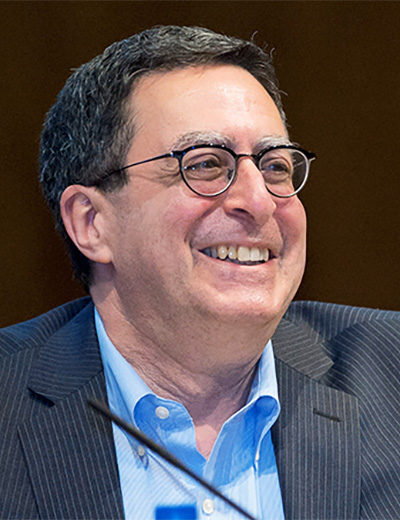 The newly launched Water Center at Penn, led by Professor of Practice Howard Neukrug, aims to open an innovation pipeline focused on water.
The newly launched Water Center at Penn, led by Professor of Practice Howard Neukrug, aims to open an innovation pipeline focused on water.
Bridging the gap between researchers and practitioners, the Water Center aims to serve as a regional hub of water expertise.
With utility costs on the rise, many low-income families struggle to pay their bills, often making difficult choices about where to allot their limited funds. Though not typically seen as social-service agencies, city-run utilities are contending with how to ensure customers have access to crucial resources, such as water, while continuing to operate sustainably.
In July 2017, Philadelphia became the first city in the country to offer an income-based Tiered Assistance Program, whereby low-income residents pay a reduced water bill and, in some cases, receive forgiveness for past-due bills. But places like Detroit and Flint, Michigan, as well as well as many other U.S. cities, face ongoing challenges when it comes to access to clean, fresh, affordable water.
At a conference held at Penn in May, stakeholders came together to unpack the challenges still faced when it comes to affordable water. Former Philadelphia Mayor Michael Nutter, as well as community leaders from around the nation, spoke at this event, one of the initial efforts of the Water Center at Penn. It is an initiative launched by Penn Professor of Practice Howard Neukrug, the Center’s inaugural director and the former commissioner and CEO of the Philadelphia Water Department.
“There is a lot of discussion right now around the idea of a human right to water,” Mr. Neukrug says. At the conference, they had people representing disadvantaged communities from Philadelphia, Detroit, Flint, and elsewhere, all coming together with water utility managers and politicians to ask what we can do to address these issues.
The focus of the gathering, organized in conjunction with the Mayors Innovation Project, Clean Water for All, and American Rivers, is a crucial one, but Mr. Neukrug has many other irons in the fire. After “retiring” from nearly four decades in the water utility sector, he joined Penn’s faculty and began teaching courses on the 21st-century water sector and on water and urban sustainability. He quickly saw the potential to do more to leverage the expertise of Penn’s faculty—and the enthusiasm of its students—to effect change and innovation when it came to water. Thus the idea for the Water Center was born.
Now, the Center has two paid staff in addition to Mr. Neukrug, two volunteers, and a slew of partnerships with organizations across the globe. The Center marked a soft launch in early May with a meeting focused on coastal resilience that brought together individuals from the U.S. Army Corps of Engineers and local and regional coastal managers. Several Penn faculty and students joined in the discussions.
“I learned so much about where things stand,” Mr. Neukrug said. “It’s clear that there’s a need to apply the work that so many schools at Penn are conducting in terms of coastal resilience, climate change, infrastructure financing and urban planning.”
Penn is not the first institution to create a water center—the University of Michigan and Columbia University, among others, have well-established entities—but Mr. Neukrug sees a unique opportunity for Penn to create a regional hub of expertise on water issues.
“I see the Water Center as something of a think tank, forming a connection between the practitioners in the applied field of water and the technology and science and global interests of the students and faculty at Penn,” he said.
Currently, the Center staff are reaching out to faculty and students whose work already intersects with water in some way to create a compendium showcasing the University’s strengths and areas for growth. Already, Mr. Neukrug is making use of his considerable network in the water sector to identify partnerships and opportunities for learning.
Working with Penn’s Netter Center for Community Partnerships and the City of Philadelphia, the Water Center is helping establish a STEM curriculum at Cobbs Creek Environmental Education Center, where new laboratory space as well as the site’s stream and constructed wetland offer opportunities for high school and perhaps also college students to test newfound water expertise. Building on Mr. Neukrug’s consulting work in Pittsburgh and the Lower Susquehanna River, the Water Center will look for ways to improve watershed health and sustainability, from both an environmental and financial point of view. And emerging partnerships on two projects based at Bartram’s Garden in Philadelphia and led by scientists and engineers from organizations, The Partnership for the Delaware Estuary, a freshwater mussel hatchery, and the Massachusetts Institute of Technology, a floating science lab, are shaping up as opportunities for Penn students to engage with the Water Center’s work.
As summer began, the Center began gearing up for October’s American Water Summit, to be held in Philadelphia for the first time. The meeting, with a theme “Inspiring Innovation,” will bring together the world’s experts and top leaders in the water industry to touch on a variety of issues, including the water-energy nexus, improving infrastructure, and planning for future challenges, such as climate change. A key partner in the conference is the Global Water Leaders Group, for which Mr. Neukrug serves as senior advisor.
“The idea for the group is that the best innovators in the world should be working together to create new innovations,” Mr. Neukrug said. “And I see a lot of opportunity, working with our colleagues throughout the School of Arts and Sciences, as well as the School of Engineering and Applied Science, the School of Design, Wharton and the Perelman School of Medicine to start talking about how to meet some of these needs and create some of these ‘uninvented technologies.’”
Part of the beauty, and the challenge, of the Water Center’s mission, is the vast reach of the water sector, encompassing everything from the technology that makes drinking water safe to consume to the societal values that govern where a city should spend its tax revenue.
But Mr. Neukrug said Penn is up to the challenge. “Everywhere I go and everyone I talk to on campus, the concept of having a water center has a different meaning,” Mr. Neukrug said. “It’s going to take a lot of interaction, different researchers working on different pieces and then coming back together to connect. I’m excited.”
University City Science Center: Ignite Innovation Campaign; Support from Penn and Wexford Science & Technology
University City Science Center: Ignite Innovation Campaign; Support from Penn and Wexford Science &Technology
The University City Science Center launched a $3 million Ignite Innovation campaign, as it prepares to move into new headquarters at 3675 Market Street. The campaign is off to a strong start with support totaling $1.1 million from the University of Pennsylvania and Wexford Science & Technology, LLC.
Such support helps the Science Center continue to inspire ideas, innovators and early-stage companies through the expansion of programming in its new location. Ignite Innovation funding will directly support the Science Center’s ability to scale and impact the entrepreneurial ecosystem through Quorum, Greater Philadelphia’s gathering space for the innovation ecosystem, and FirstHand, the Science Center’s STEM program for middle and high school students. Funding will allow Quorum to continue to offer its free signature programming that the start-up community has relied on as a “go-to” source for thought leadership, advice and connections. And FirstHand will be able to expand its nationally-recognized STEM-focused programming to more students at more schools in Philadelphia.
“Thanks to Wexford and the University of Pennsylvania’s support, we are able to equip scientists, innovators, entrepreneurs and students with the resources they need to spur innovation in Greater Philadelphia—and continue making a positive impact in the world,” said Curtis M. Hess, Interim President and CEO of the Science Center.
“The University of Pennsylvania is proud to support the Science Center. By fostering a fertile and thriving innovation ecosystem, the Science Center plays an integral part in driving economic activity in our region,” said Craig R. Carnaroli, Penn’s EVP and chairman of the Board of the Science Center. “The growth and development of the Science Center’s programs will help retain talented students and researchers in Philadelphia, enabling start-ups to grow, scale and contribute to the vitality of our region.”
“Supporting Quorum, the largest gathering space in Philadelphia dedicated to promoting collaboration and entrepreneurship in the region’s innovation ecosystem, is essential to the success and continued growth of uCity Square. We are delighted to make this philanthropic investment in the Science Center,” said James Berens, Founder and CEO, Wexford Science & Technology.
Additional support for the Ignite Innovation campaign comes from Knoll and their dealer partner CFI, recognized as Quorum’s furniture sponsor.
 On July 1, Joseph S. Francisco joined Penn as the President’s Distinguished Professor of Earth and Environmental Science, with a secondary appointment in the department of chemistry. Having served as the Elmer H. and Ruby M. Cordes Chair in Chemistry and Dean of the College of Arts and Sciences at the University of Nebraska–Lincoln, Dr. Francisco is an internationally recognized scholar of atmospheric chemistry and chemical kinetics. His work extends across chemical, earth and environmental sciences.
On July 1, Joseph S. Francisco joined Penn as the President’s Distinguished Professor of Earth and Environmental Science, with a secondary appointment in the department of chemistry. Having served as the Elmer H. and Ruby M. Cordes Chair in Chemistry and Dean of the College of Arts and Sciences at the University of Nebraska–Lincoln, Dr. Francisco is an internationally recognized scholar of atmospheric chemistry and chemical kinetics. His work extends across chemical, earth and environmental sciences.
 Professor of political science John Lapinski was named the Robert A. Fox Leadership Professor of Political Science and the director of the Robert A. Fox Leadership Program effective July 1. A renowned expert on national elections, survey research and Congress, Dr. Lapinski is also Director of the Elections Unit at NBC News and analyzes and produces election-related stories through exit polls for NBC News, MSNBC, CNBC, Telemundo and all of NBC’s digital properties. In addition, he is the founding faculty director of Penn’s Program for Opinion Research and Election Studies (PORES), which trains undergraduates in public policy, elections research and data analytics. He also currently serves as the associate faculty director of the Fox Program and the faculty director of the Fels Executive Master of Public Administration Program.
Professor of political science John Lapinski was named the Robert A. Fox Leadership Professor of Political Science and the director of the Robert A. Fox Leadership Program effective July 1. A renowned expert on national elections, survey research and Congress, Dr. Lapinski is also Director of the Elections Unit at NBC News and analyzes and produces election-related stories through exit polls for NBC News, MSNBC, CNBC, Telemundo and all of NBC’s digital properties. In addition, he is the founding faculty director of Penn’s Program for Opinion Research and Election Studies (PORES), which trains undergraduates in public policy, elections research and data analytics. He also currently serves as the associate faculty director of the Fox Program and the faculty director of the Fels Executive Master of Public Administration Program. President Amy Gutmann and EVP Craig Carnaroli announced the promotion of Gregory (Greg) J. Pellicano to Vice President for Audit, Compliance and Privacy which was effective June 22 from his prior role as the Associate Vice President. Mr. Pellicano, along with his 33-member professional staff, provide assurance and advisory services and oversee the compliance and privacy programs for both the University and Penn Medicine.
President Amy Gutmann and EVP Craig Carnaroli announced the promotion of Gregory (Greg) J. Pellicano to Vice President for Audit, Compliance and Privacy which was effective June 22 from his prior role as the Associate Vice President. Mr. Pellicano, along with his 33-member professional staff, provide assurance and advisory services and oversee the compliance and privacy programs for both the University and Penn Medicine. After a wide-ranging search, Mark Kocent, was appointed as the University Architect effective July 2.
After a wide-ranging search, Mark Kocent, was appointed as the University Architect effective July 2. Sharon Hayes, associate professor of fine arts, is this year’s recipient. She is an artist whose work engages multiple media, including video, performance and installation, in an ongoing investigation into specific intersections between history, politics and speech. Ms. Hayes has had solo exhibitions at Andrea Rosen Gallery, New York; Tanya Leighton Gallery, Berlin; Whitney Museum of American Art, New York; and Museo Nacional Centro de Arte Reina Sofía, Madrid. Her work was included in the 2013 Venice Biennale, as well as exhibitions at the Museum of Modern Art, New York; Solomon R. Guggenheim Museum, New York; and numerous museums and venues in Europe and the Americas. Ms. Hayes is a recipient of a Guggenheim Fellowship (2014), the Alpert Award in Visual Arts (2013), an Anonymous Was a Woman Award (2013), and a Louis Comfort Tiffany Foundation Fellowship (2007) among other awards. She earned master of fine arts from the University of California, Los Angeles, and a bachelor of the arts from Bowdoin College. Ms. Hayes also attended the Whitney Museum of American Art Independent Study Program. Ms. Hayes teaches both graduate and undergraduate studio courses, including video and performance, as well as interdisciplinary courses such as Across Forms: Art & Writing.
Sharon Hayes, associate professor of fine arts, is this year’s recipient. She is an artist whose work engages multiple media, including video, performance and installation, in an ongoing investigation into specific intersections between history, politics and speech. Ms. Hayes has had solo exhibitions at Andrea Rosen Gallery, New York; Tanya Leighton Gallery, Berlin; Whitney Museum of American Art, New York; and Museo Nacional Centro de Arte Reina Sofía, Madrid. Her work was included in the 2013 Venice Biennale, as well as exhibitions at the Museum of Modern Art, New York; Solomon R. Guggenheim Museum, New York; and numerous museums and venues in Europe and the Americas. Ms. Hayes is a recipient of a Guggenheim Fellowship (2014), the Alpert Award in Visual Arts (2013), an Anonymous Was a Woman Award (2013), and a Louis Comfort Tiffany Foundation Fellowship (2007) among other awards. She earned master of fine arts from the University of California, Los Angeles, and a bachelor of the arts from Bowdoin College. Ms. Hayes also attended the Whitney Museum of American Art Independent Study Program. Ms. Hayes teaches both graduate and undergraduate studio courses, including video and performance, as well as interdisciplinary courses such as Across Forms: Art & Writing. Eric Bellin, lecturer and PhD candidate in architecture, is this year’s recipient of the award for underegraduate teaching. This award rotates each year between architecture and fine arts.
Eric Bellin, lecturer and PhD candidate in architecture, is this year’s recipient of the award for underegraduate teaching. This award rotates each year between architecture and fine arts. Ben Krone, a lecturer in architecture, is this year’s recipient. He is the founder of Gradient, a design studio whose work focuses on procedural approaches to manipulating surface systems and bridging the gap between architecture, product design and graphic art. His past achievements include an installation for the Cooper Hewitt Design Museum, collaborations with several acclaimed artists and multiple award-winning residential and commercial projects. Currently Gradient is working on a number of larger projects including boutique hotel in Brooklyn and a large residential tower in Jersey City. Mr. Krone earned his bachelor of architecture from the University of Florida. He received his master’s degree from Columbia University Graduate School of Architecture, where he was the recipient of the McKim Prize for Excellence in design and the Sol Kaplan Traveling Fellowship. He teaches graduate studio courses, including recent design studios entitled Co/Habitation and Perpetual Motion. He also teaches in the Integrated Product Design program at Penn.
Ben Krone, a lecturer in architecture, is this year’s recipient. He is the founder of Gradient, a design studio whose work focuses on procedural approaches to manipulating surface systems and bridging the gap between architecture, product design and graphic art. His past achievements include an installation for the Cooper Hewitt Design Museum, collaborations with several acclaimed artists and multiple award-winning residential and commercial projects. Currently Gradient is working on a number of larger projects including boutique hotel in Brooklyn and a large residential tower in Jersey City. Mr. Krone earned his bachelor of architecture from the University of Florida. He received his master’s degree from Columbia University Graduate School of Architecture, where he was the recipient of the McKim Prize for Excellence in design and the Sol Kaplan Traveling Fellowship. He teaches graduate studio courses, including recent design studios entitled Co/Habitation and Perpetual Motion. He also teaches in the Integrated Product Design program at Penn. Important research undertaken by undergraduate students in the Penn Slavery Project independent study supervised by Penn Professor Kathleen M. Brown, the David Boies Professor of History in the School of Arts and Sciences, has given us a clearer understanding of the depth and breadth of Penn’s connections to slavery. This was a profoundly painful and odious part of our nation’s history. No segment of American society or institution founded during the 18th century, including the University of Pennsylvania, escaped its scourge. Far from it.
Important research undertaken by undergraduate students in the Penn Slavery Project independent study supervised by Penn Professor Kathleen M. Brown, the David Boies Professor of History in the School of Arts and Sciences, has given us a clearer understanding of the depth and breadth of Penn’s connections to slavery. This was a profoundly painful and odious part of our nation’s history. No segment of American society or institution founded during the 18th century, including the University of Pennsylvania, escaped its scourge. Far from it. The Health Resources and Service Administration (HRSA) of the U.S. Department of Health and Human Services has awarded a $2 million grant over the next five years to the Occupational and Environmental Medicine (OEM) Residency Program in the department of emergency medicine at Penn’s Perelman School of Medicine. This grant will help train the next generation of OEM physicians.
The Health Resources and Service Administration (HRSA) of the U.S. Department of Health and Human Services has awarded a $2 million grant over the next five years to the Occupational and Environmental Medicine (OEM) Residency Program in the department of emergency medicine at Penn’s Perelman School of Medicine. This grant will help train the next generation of OEM physicians. Sharon Smith, Executive Director of Student Intervention Services, has been named Associate Vice Provost for University Life. Since June 19, she has been a member of VPUL’s Central Resource Management Team (CRMT) reporting directly to Vice Provost Valarie Swain-Cade McCoullum.
Sharon Smith, Executive Director of Student Intervention Services, has been named Associate Vice Provost for University Life. Since June 19, she has been a member of VPUL’s Central Resource Management Team (CRMT) reporting directly to Vice Provost Valarie Swain-Cade McCoullum. Barbara Hewitt has been named Executive Director of Career Services. Dr. Hewitt, currently Senior Associate Director, will assume her new position in August after the retirement of longtime Career Services Director Patricia Rose.
Barbara Hewitt has been named Executive Director of Career Services. Dr. Hewitt, currently Senior Associate Director, will assume her new position in August after the retirement of longtime Career Services Director Patricia Rose. Jazmyn S. Pulley was named Director of the Office of Fraternity and Sorority Life at Penn effective July 9. A longtime member of Zeta Phi Beta Sorority Inc. and the former associate director of fraternity and sorority life at Columbia University, Ms. Pulley has national leadership experience in the Association of Fraternity/Sorority Advisors.
Jazmyn S. Pulley was named Director of the Office of Fraternity and Sorority Life at Penn effective July 9. A longtime member of Zeta Phi Beta Sorority Inc. and the former associate director of fraternity and sorority life at Columbia University, Ms. Pulley has national leadership experience in the Association of Fraternity/Sorority Advisors. The University of Pennsylvania is pleased to announce a gift of $1 million from Johnson & Johnson to the School of Nursing and the Wharton School. This investment launches the Nursing/Wharton Impact Scholars Loan Program, a program that will increase the number of health care leaders with expertise in both business and clinical care by offering financial aid and providing underserved communities with greater access to health professionals.
The University of Pennsylvania is pleased to announce a gift of $1 million from Johnson & Johnson to the School of Nursing and the Wharton School. This investment launches the Nursing/Wharton Impact Scholars Loan Program, a program that will increase the number of health care leaders with expertise in both business and clinical care by offering financial aid and providing underserved communities with greater access to health professionals. The newly launched Water Center at Penn, led by Professor of Practice Howard Neukrug, aims to open an innovation pipeline focused on water.
The newly launched Water Center at Penn, led by Professor of Practice Howard Neukrug, aims to open an innovation pipeline focused on water..jpg) D. Walter Cohen, dean emeritus of the University of Pennsylvania School of Dental Medicine, died June 29 at the age of 91.
D. Walter Cohen, dean emeritus of the University of Pennsylvania School of Dental Medicine, died June 29 at the age of 91.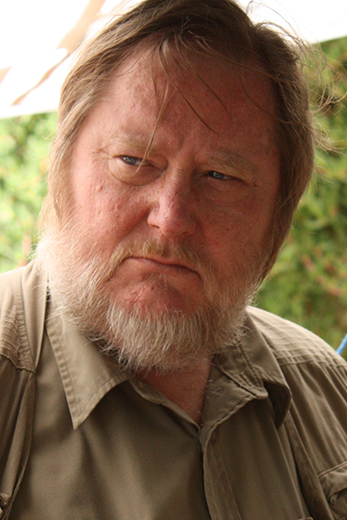 Harold Lewis Dibble, archeologist and the Francis E. Johnston Endowed Term Professor of Anthropology (Almanac September 5, 2017), died on June 10 from complications due to cancer. He was 66.
Harold Lewis Dibble, archeologist and the Francis E. Johnston Endowed Term Professor of Anthropology (Almanac September 5, 2017), died on June 10 from complications due to cancer. He was 66.cropped.jpg) Robert (Bob) M. Engman, sculptor and professor emeritus of fine arts, died on July 4 of respiratory failure. He was 91.
Robert (Bob) M. Engman, sculptor and professor emeritus of fine arts, died on July 4 of respiratory failure. He was 91..jpg) Thomas Waldman, former staff member at the School of Arts and Sciences and adjunct associate professor in the department of history, died on July 1 at age 79.
Thomas Waldman, former staff member at the School of Arts and Sciences and adjunct associate professor in the department of history, died on July 1 at age 79._10-25-16.jpg) Anita L. Allen, the Henry R. Silverman Professor of Law and Professor of Philosophy and vice provost for faculty, became the first black woman president of the Eastern Division of the American Philosophical Association on July 1. Dr. Allen is an expert on privacy law, the philosophy of privacy, bioethics and contemporary values, and she is recognized for scholarship about legal philosophy, women’s rights and race relations.
Anita L. Allen, the Henry R. Silverman Professor of Law and Professor of Philosophy and vice provost for faculty, became the first black woman president of the Eastern Division of the American Philosophical Association on July 1. Dr. Allen is an expert on privacy law, the philosophy of privacy, bioethics and contemporary values, and she is recognized for scholarship about legal philosophy, women’s rights and race relations..jpg) Shinjae Chung, assistant professor of neuroscience in the Perelman School of Medicine, has received a 2017 Hartwell Individual Biomedical Research Award, which provides financial support for innovative, early-stage biomedical research with the potential to benefit children of the United States. The award provides funding for three years at $100,000 in direct costs per year for Dr. Chung’s proposal, “Remedying Sleep Disturbances in Autism Spectrum Disorder.” Dr. Chung, who studies the neural circuits that underlie sleep, is one of only 12 researchers recognized nationwide this year as a Hartwell Investigator by The Hartwell Foundation.
Shinjae Chung, assistant professor of neuroscience in the Perelman School of Medicine, has received a 2017 Hartwell Individual Biomedical Research Award, which provides financial support for innovative, early-stage biomedical research with the potential to benefit children of the United States. The award provides funding for three years at $100,000 in direct costs per year for Dr. Chung’s proposal, “Remedying Sleep Disturbances in Autism Spectrum Disorder.” Dr. Chung, who studies the neural circuits that underlie sleep, is one of only 12 researchers recognized nationwide this year as a Hartwell Investigator by The Hartwell Foundation. Casey Greene, a PSOM assistant professor of systems pharmacology and translational therapeutics, has been awarded funding from the Chan Zuckerberg Initiative, an advised fund of Silicon Valley Community Foundation. The Initiative was created by Facebook founder Mark Zuckerberg and his wife, Priscilla Chan, a pediatrician.
Casey Greene, a PSOM assistant professor of systems pharmacology and translational therapeutics, has been awarded funding from the Chan Zuckerberg Initiative, an advised fund of Silicon Valley Community Foundation. The Initiative was created by Facebook founder Mark Zuckerberg and his wife, Priscilla Chan, a pediatrician. Reed Pyeritz, the William Smilow Professor in the Division of Translational Medicine and Human Genetics at the Perelman School of Medicine, has been given the 2018 Hero with Heart Award by the Marfan Foundation.
Reed Pyeritz, the William Smilow Professor in the Division of Translational Medicine and Human Genetics at the Perelman School of Medicine, has been given the 2018 Hero with Heart Award by the Marfan Foundation..jpg) Wendy White, senior vice president and general counsel for the University of Pennsylvania, was one of three 2018 GC Impact award winners recognized by The Legal Intelligencer. This award acknowledges chief legal officers who, through their effective leadership, had significant accomplishments in 2017. Ms. White advises and represents the entire University as well as the University of Pennsylvania Health System. The award recognized her for her support of cutting-edge innovation over the past year, specifically her leadership and hard work that contributed greatly to the success of the FDA-approved CAR T-cell therapy for acute lymphoblastic leukemia, a first for this kind of therapy, developed at Penn. The award also noted Ms. White’s thought leadership on a range of complex issues at Penn, including academic freedom, sexual harassment, Title IX compliance, and the UPHS expansion to a new hospital and the Pennovation Center.
Wendy White, senior vice president and general counsel for the University of Pennsylvania, was one of three 2018 GC Impact award winners recognized by The Legal Intelligencer. This award acknowledges chief legal officers who, through their effective leadership, had significant accomplishments in 2017. Ms. White advises and represents the entire University as well as the University of Pennsylvania Health System. The award recognized her for her support of cutting-edge innovation over the past year, specifically her leadership and hard work that contributed greatly to the success of the FDA-approved CAR T-cell therapy for acute lymphoblastic leukemia, a first for this kind of therapy, developed at Penn. The award also noted Ms. White’s thought leadership on a range of complex issues at Penn, including academic freedom, sexual harassment, Title IX compliance, and the UPHS expansion to a new hospital and the Pennovation Center..jpg) Dr. Li was selected for outstanding contributions to statistical genetics and genomics, as well as scientific discoveries in the genetics of cardiometabolic disease and age-related macular degeneration. Dr. Li was also cited for her editorial and other professional contributions to the field.
Dr. Li was selected for outstanding contributions to statistical genetics and genomics, as well as scientific discoveries in the genetics of cardiometabolic disease and age-related macular degeneration. Dr. Li was also cited for her editorial and other professional contributions to the field..jpg) Dr. Xie was selected for excellent and sustained statistical collaborative and methodological research in the area of neurodegenerative diseases, exemplary mentoring of biostatistics graduate students and medical researchers, leadership and development of outstanding biostatistics core facilities with national impact in neurodegenerative disease research and for service to the profession.
Dr. Xie was selected for excellent and sustained statistical collaborative and methodological research in the area of neurodegenerative diseases, exemplary mentoring of biostatistics graduate students and medical researchers, leadership and development of outstanding biostatistics core facilities with national impact in neurodegenerative disease research and for service to the profession.


